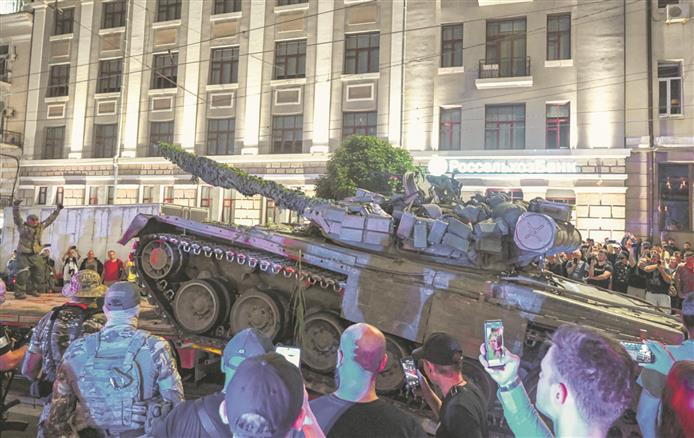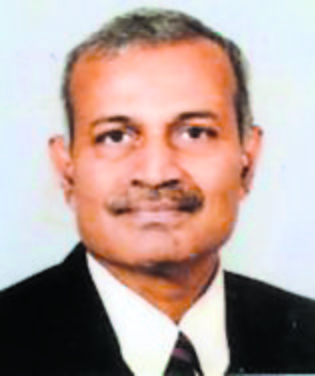
Advertisement

The mutiny or rebellion, or whatever it is being presented as by the Russian establishment, shows apparent cracks in President Putin’s overwhelming authority, and could well force him to exit the Ukraine war on unfavourable terms. Yevgeny Prigozhin’s Wagner Group poses a direct challenge after forcing an amnesty agreement on Moscow. Having overrun two Russian cities, Wagner was threatening a march to Moscow itself, till the deal stopped its advance. Though Moscow accused the group of treason, all charges were subsequently dropped. The Wagner troops are expected to return to their bases and regroup in western Belarus. Alexander Lukashenko of Belarus was apparently the one who negotiated Putin’s deal with Wagner.
Unregulated elements such as Wagner Group can cause incalculable damage to Russia’s polity.
A probable NATO hand in these developments cannot be ruled out, seeing the dramatic manner in which the once-loyal fringe group, Putin’s own militia deployed earlier in Crimea and Syria, rose up in arms. The statement by Prigozhin about the Ukraine invasion being uncalled-for and a result of career ambitions of Russian Generals does not augur well for Putin. Prigozhin was last seen leaving Rostov-on-Don, one of the cities in which military facilities were taken over by his fighters. Apparently, Russia has interfered with Wagner’s normal communication lines and more details of the rebellion would emerge once these are restored. US Secretary of State Blinken is of the opinion that it is too early to predict the course of the war, now that Putin has to defend Moscow against a mercenary entity of his own machinations.
The Wagner Group had an easy run pushing towards Moscow before the truce was called. More importantly, Prigozhin is a free man who could well orchestrate further problems for Putin down the line. A former criminal cultivated by Putin to fight his shadow wars in Syria and Mali, he formed the Wagner Group in 2014, publicly denying raising the private militia. The deniability built into Wagner’s operations had made him a favourite with the Russian leader. As a mercenary at ease with violence, Prigozhin was an outsider to Putin’s close coterie of advisers, and known to have a perennial animosity towards Valery Gerasimo, head of Russian military, and Russian Defence Minister Sergei Shoigu. Most of Putin’s cronies hailed from his hometown of St Petersburg, whereas Shoigu was born in a tiny rural area along the Russo-Mongolian border. It is interesting that despite leading the Russian military for over a decade, Defence Minister Shoigu has never served in uniform. Prigozhin’s anti-military stance is known to have got exacerbated after the Wagner Group’s rout in the bloody Battle of Bakhmut, wherein several Wagners, recruited from Russia’s jails, are known to have perished. These in-house rivalries are part of Putin’s style of functioning. Prigozhin also nursed a grudge over the Russian military withholding ammunition for his troops.
It is believed that Putin had a virtual “trip wire” to prevent a coup, with all actors in the drama checkmating each other. Some analysts believe that Putin is in favour of prolonging the Ukraine war mainly to benefit the 10-odd defence corporations bankrolling the Ukraine operations. The Wagner Group itself is known to have booty close to $50 million. But there is no gainsaying that prolongation of the Ukraine war holds a serious domestic political risk for the entire Russian Federation and for Putin himself. The Wagner Group could well regroup in Belarus and keep their shadow operations going from there. On the whole, the situation is murky and could well deteriorate into a civil war in Russia. Wagner may not itself have any air force of its own, but it’s a question of time before that happens. Unregulated elements such as these may support short-term ambitions of autocratic leaders but can cause incalculable damage to Russia’s polity. The European NATO countries would love to see Putin stew in his own soup, no doubt, and the supply of planes, tanks and howitzers orchestrated by the US would ultimately beef up Ukraine sufficiently to sustain the war, and perhaps ultimately sound the death knell for Putin and his ambitions. The Russia-Ukraine war is rather unconventional in that the use of air power has been curtailed largely and the deployment of drones has also been limited. The Iranians are known to have supplied attack drones to Russia and these could well find employability by the Wagner Group, creating substantial problems for Russian armour in border areas as well as Russian ground troops. Countries like Turkey would like to cash in on the profitability of selling assets such as Bayraktar.
For the kind of ground operations envisaged, with limited distances and manoeuvres, it is conceivable that the air situation could turn into what happened in Nagorno-Karabakh with the Armenians and Azerbaijanis. Drones would then play an important role in the ground battle and city warfare. Sabotage operations by Ukrainians against Russian assets and by the Wagner Group, against whosoever they perceive as inimical, would be the highlights of the war in Europe going forward. As for the air war, the training of Ukrainian pilots on F-16s by NATO and the possible influx of additional MiG-29s to beef up the Ukrainian air force are noteworthy. On the pros and cons of bringing in armed private militias into regular combat, the advantages of dramatic surprise attacks that Wagner offered were clearly negated by the chaos and unreliability posed by its nefarious wheeling-dealing and guerrilla warfare. There is no substitute for regular volunteer fighting forces, wherever be the theatre of war. The Russian mafia gangs of the Soviet era seem to have spurred unaccountability, as espoused by the likes of the Wagner Group.
